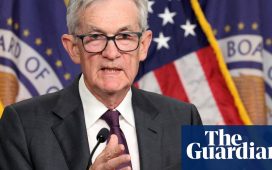Kamala Harris will announce plans to tackle high grocery costs by targeting corporations in the food and grocery industry, as she previews her economic agenda ahead of the November election.
She will also tackle prescription drug and housing costs, drawing a contrast with Trump on tariffs and taxes, according to a Harris campaign statement.
Harris is expected to lay out some details of her economic plan in a speech in North Carolina on Friday.
“Same values, different vision,” said one aide, describing how Harris’s economic agenda will compare with that of Joe Biden, who stepped aside as the Democratic presidential candidate last month.
“She’s not moving far away from him on substance, she will highlight the ones that matter most to her.”
In July, inflation fell to below 3% for the first time in nearly three and a half years, the labor department said on Wednesday, but high prices of groceries and consumer goods remain well above their pre-pandemic levels, and are front of mind for voters.
Among the plans from the Harris campaign is a federal ban on price-gouging in the industries. Most states currently have such bans in place. The ban will apply to corporations in the food and grocery industries, stopping them “from unfairly jacking up prices on consumers”.
Harris will single out meat prices, and in particular the meat-processing industry. Her first 100 days will also see support for small businesses, a “crack down on unfair mergers and acquisitions” among food corporations.
Trump has repeatedly claimed, without evidence, that the Democrats want to ban red meat. Speaking in Pennsylvania on 31 July, he said that Harris wants to “get rid of your cows” and wants to “slash consumption of red meat”.
The Harris campaign has so far centred healthcare and abortion rights, with the first campaign ad focused on gun violence, reproductive freedom, child poverty and affordable healthcare.
Harris no longer supports measures from her short-lived 2020 presidential bid such as a fracking ban or Medicare for All, advisers told Reuters. Not all of the elements of Harris’ economic agenda will make it to the Friday speech, a draft of which is still in the works. Her campaign said it wanted to avoid dividing voters and attracting attacks from business groups over granular details, and will be “strategically ambiguous” in areas such as energy.
She will push plans to cut costs of rental housing and home ownership, including funding more affordable housing and building climate resistant communities.
“She does have a focus on housing because we know and she knows very, very clearly that housing is a crisis in this country,” said Marcia Fudge, a Harris adviser and the former housing and urban development secretary under Biden.
Harris will also draw contrasts with Trump on tax policy and tariffs and maintain Biden’s promise not to raise taxes on people who make $400,000 or less a year, advisers said. Trump slashed the corporate tax rate from 35% to 21% and implemented other tax breaks that are set to expire next year.
The Trump campaign has been mulling new tax cuts for middle-class households, and has proposed eliminating taxes on tipped wages – something Harris also recently said she supported.
Trump has promised to make the tax cuts permanent and suggested new, across-the-board tariffs on imports, an idea Harris rejects.
In a campaign speech in Asheville, North Carolinawhich was billed as an address on the economy, Trump veered off topic, saying his advisers had wanted him to focus on economic concerns. He was “not sure”, however, that the economy is the most important issue of the election, he said.
Trump used a “travel-sized” box of Tic Tacs to make a point about inflation.
“This is Tic Tacs,” he said, holding up a standard-sized box of the mints. “This is inflation,” he said, holding up the smaller box. He called it the “greatest commercial they ever had”.
The Guardian contacted Ferrero, the company that makes Tic Tacs, for comment.
Trump spokesperson Karoline Leavitt told Reuters: “America cannot afford another four years of Kamala’s failed economic policies. President Trump has a proven track record of making this country prosperous and affordable, and Americans can trust him to put more money back in their pockets again.”
Biden was briefed on the economy on Thursday by the US treasury secretary Janet Yellen, commerce secretary Gina Raimondo, national economic adviser Lael Brainard and others. “The group discussed the resilience of the US economy, with inflation falling below 3%, strong business investment and consumer spending, and a healthy job market,” according to a pool report.
Reuters contributed reporting









